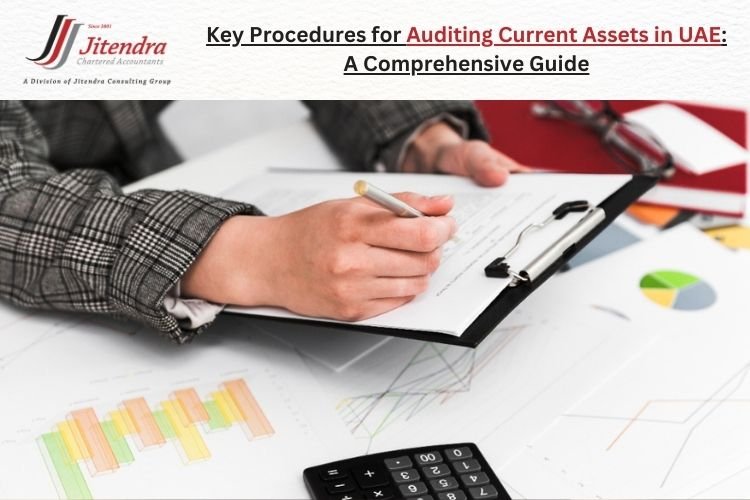
Key Procedures for Auditing Current Assets in UAE: A Comprehensive Guide
Internal audits of current assets are the most significant process that should be carried out by a firm so that financial accuracy is retained. In case proper auditing measures are absent, errors may emerge in financial reports and statements. Mismanagement in handling current assets leads to losses and the potentiality for infringement against controls and regulations. Therefore, to mitigate these challenges, a business needs to adhere to clear audit procedures that ensure current assets are correctly reported and well managed.
Businesses can also outsource auditing services from approved and registered auditors in UAE for accurate results and comprehensive audit reports.
The following explains the key procedures involved in auditing current assets, helping an organisation secure its finances;
Audits in UAE: What Are Current Assets?
Current assets are resources a company expects to convert into cash within one year. These resources will either be utilised, consumed or sold to other parties within a single financial year of a business. These resources are important for daily operations as well as for managing liquidity. Some examples include:
- Cash and cash equivalents: Ready cash or liquid investments.
- Accounts receivable: Amounts owed by customers for delivered products or services.
- Inventory: Goods available for sale or in the production process.
- Short-term investments: Temporary financial assets.
It would determine if reported values indeed align with the real figures with appropriate proof
Key Audit Procedures for Current Assets in UAE
A normal current asset audit primarily depends on three methods, which are confirmation, observation, and analytic review. These techniques form distinct processes toward achieving perfect account presentation;
- Confirmation
Confirmation is the process of checking asset balances by reviewing supporting documents or contacting third parties. For example:
- Confirming bank balances through direct communication with the bank.
- Checking accounts receivable by calling customers to confirm outstanding amounts.
- Reviewing documents like cancelled checks and invoices for accuracy.
- Observation
Observation aids in validating the existence and physical presence of assets. The observation process can:
- Count inventory items to ensure they match recorded figures.
- Checking cash in hand for consistency with records of finances.
- Observation is most required for assets that are prone to theft, damage, and misstatement.
- Observation also includes physical observation of assets, including cash and inventory.
- Analytical Review
Analytical review relies on the use of analytical techniques to determine the reasonableness of reported balances. Auditors may:
- Compare budgeted figures with actual figures.
- Analyse trends in asset value over time.
- Use statistical procedures to identify anomalies.
Audits in UAE: Kinds of Current Assets
Auditors classify current assets into two primary categories:
- Operating Current Assets: These represent daily operations and use cash and inventory besides accounts receivables.
- Non-operating current assets: Such assets involve short-term investment or a short loan.
Factors Influencing Audit Procedures in UAE
Several factors affect how auditors approach the auditing of current assets. These include:
- Nature of business: The nature of business impacts audit focus. For instance, an audit focusing more on inventory for a retail or more on receivables for a service company
- Size of the company: Larger companies may require detailed procedures because of their diversified operations.
- Nature of Transaction: Accounting that is cash-based requires distinct checks than accrual accounting type.
- Internal Controls: Organisations with effective internal controls tend to have fewer audit problems. Auditors determine the effectiveness of these controls as part of the process.
Internal Controls Significance
Internal controls are the most critical aspect of safeguarding current assets. Policies and procedures are devised for error and fraud prevention. Auditors assess the effectiveness of such controls by:
- Whether they are working as they should.
- Any weaknesses that could lead to financial misstatements.
The Role of Auditors
Auditors play a very significant role in the process of ensuring that financial reporting is accurate. They can be classified into two types:
- External Auditors: These are independent professionals who are hired specifically for reviewing financial statements and giving the most unbiased opinions of the accuracy of the financial reports. JCA is one of the best approved auditors in UAE.
- Internal Auditors: Employees who work for the company but with a focus on process improvement and risk identification.
Advantages of Auditing Current Assets
Auditing of current assets has numerous advantages for firms, including:
- Ability to trace potential errors or dangers associated with financial reporting.
- Adherence to accounting standards and law requirements would be enhanced.
- Ensure credibility and dependability of financial data provided for stakeholders.
- Making business decisions based on verifiable information.
Choose the Best Approved Auditors in UAE
Jitendra Chartered Accountants are registered auditors in UAE licensed to provide high quality auditing services in UAE. We prepare your audit reports with accuracy, transparency and efficiency. We also provide unbiased opinions to help you incorporate better actions depending on your audit report results. Hire an expert auditor at JCA today!


